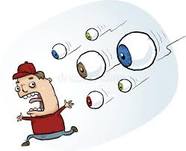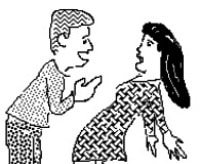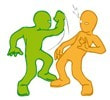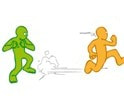
When I wrote this blog originally I had just finished copy edits for an impending book release and, as a result, felt exasperated by comments from the editor. Since this continues to be an issue with editors and authors, reviving and updating the blog seemed worthwhile.
One sentence in my manuscript read, 'Her wide gray eyes gazed into his, growing even larger, as though he’d taken her by surprise.' The editor's comment was, “All by themselves? Body parts can’t act independently.”
Really? I beg to differ, even though I know I will lose the battle. When you have your eyes closed, and you hear a loud, unexpected noise near your head, don't your eyes pop open? Or do you say to yourself, "That loud noise scared me so I will open my eyes now to see what it was."?
While I realize publishing houses have their standards and the editor will prevail, and I understand the concerns editors have for eyes flying across rooms and arms that lift, I have to wonder if they've never read about Retained Neonatal Reflexes, muscle memory, or reflex actions? How about body language, which makes up over fifty percent of human communication?
Here are some examples from over the years of being published. I'm not claiming these are the greatest literary sentences in western literature, but I also don't think the editor's comments applied.
● My confused mind grappled with the sensation that I didn't know where or who I was.

● His brow scrunched into a confused frown.
A person can definitely decide consciously to frown. However, if surprised, startled, or in spontaneous response to a sudden emotion, a human being can frown as a reflex action. To me, saying, "He scrunched his brow into a frown" sounds like an intentional action. The other form seems more like a reflex action in response to the situation.
● My stomach clenched.
Sorry, but I don't purposely clench my stomach. Do you?
I’ve done a fair amount of research on body language and, under certain circumstances, some body parts do, in fact, take actions independent of conscious thought. And that’s a scientifically proven fact.

There are lots of books, publications, and classes on interpreting body language. I've used some of them to write this. I am by no means an expert, but a lot of it you already know. I just want to prove my point.

Are readers so unfamiliar with body language that they will be confused or misinterpret the words authors write? Personally, I don’t think so.
The study of body movements is called Kineses, and there is abundant research available on the topic. Research shows:
● Most humans communicate more through body language than through speech.
● Most humans are very adept at interpreting body language.
● Body language is so important that descriptions of it have become integral parts of our written and spoken language. For example, if you write that someone blinked to show the character's confusion, or you write that someone is bleary eyed to mean he was not focusing, that doesn't need to be explained. Readers get it.
● A substantial amount of body language gestures are reflexive and unconscious, but it is possible to learn to control some of them. It's not necessarily easy, but possible.
● Individual body language gestures can mean more than one thing and should be interpreted in relation to other gestures, activities, and other kinds of information (particularly since it is possible for a person to control the body language gestures).
●Kevin Hogan, Psy.D., Body Language Expert, says nonverbal communication is between 60% to 75% of the impact of a message. I've read other experts who claim it is as high as 90%. You can be sure that over 50% is nonverbal communication.
BODY LANGUAGE INDICATORS
Body language is defined by some as a reaction to an emotion. Because writers use those non-verbal indicators of mood and emotion in their writing, it’s good to be familiar with reading and understanding body language. At the end, I’ve listed several links for interpreting body language that you may find useful. Below are categories of body movements that can be used to describe mood and emotion. As noted above, it is possible for a human being to learn to control many of the following indicators.

● Head motion
● Paralanguage
● Facial expression
● Personal Space
● Gestures
● Other movements and aspects of the eyes
● Silence
● Listening
UNCONSCIOUS REFLEXES
To some extent humans retain some of the involuntary reflexes (controlled by the lower centers of our brain) from the womb when the central nervous system is not fully developed. In the early years of life, as the higher centers of the brain begin to mature, these reflexes are gradually integrated. But there are certain residual primary reflexes that stick with us.
● Fear
● Pain
● Surprise
● Anything that triggers fight or flight response.
According to Body Language Insights, “Body language is a largely automatic response to fearful situations. The behaviors of our body language are mostly innate to us, though some might be inherited. Either way, we have little knowledge of or control over when our bodies react to fear and how. Depending on the severity of the situation, our fear can excite us, encourage us, shock us, or completely paralyze us. And it will be written all over our faces!”
Fight Flight Fear
So, in situations where our fictitious characters are startled, surprised, hurt, or stressed (including anticipation of something unpleasant), the body does react without conscious thought, both viscerally and physically. Sure, the reacting body parts are attached to a person’s central nervous system which is sending signals to cells as electrochemical waves travelling along thin fibers called axons, but that’s happening at a subconscious level. For all intents and purposes, the body parts are acting independently of the cerebrum.
So, if your character is startled by a loud noise and gasps or her hand rises rapidly and reflexively (God forbid that it “fly”) to cover her heart, it isn’t because she stops to think, “Wow! That startled me. I am going to raise my hand to cover my racing heart.” It happens as an involuntary action. The hand does raise itself of its own volition.

Muscle memory can be described as a type of movement repeated so often that the muscles become familiar with it over time. When a movement is repeated over and over, a long-term muscle memory is created for that task, eventually allowing it to be performed without conscious thought or effort.
Photo: afrikareporter.com/
Therefore, in a physical situation such as a fight, playing a sport, playing a musical instrument, driving (in a novel or real life), if a person has been well trained, the reactions of the body may be the result of muscle memory and basically act independently. You can do something without realizing you’re doing it, depending on the circumstances and action involved.
VISCERAL REACTIONS
These reactions are more accepted by readers and editors as uncontrollable reactions, but many are detectible, usually through sight or smell, by others and can be used to alert other characters in your story (and readers) what’s going on. The problem is, people have these visceral reactions for lots of reasons. Hence, the advice that one needs to observe a number of body language indicators, the surroundings, and what is happening, before interpreting what the other person is thinking/feeling.
There are additional signals the body sends that are detectible to others and give them impressions and information about the person. There are also important body language indicators which are not, for the most part, controllable. Those tend to be visceral (characterized or proceeding from instinct rather than intellect) reactions.

While many secretions are detectible only by smell, others such as tears and watering of the eye, perspiration, and saliva, can be visual. There are other secretions, but I’m not going to go there. (FYI: Earwax is also a secretion, but I doubt that it has much of a role in writing novels.)

Gross! Gaseous outputs include exhaling, sneezing, coughing, burping, and intestinal gas. They all give information about the body and, in some cases, mood or emotional reaction. A sigh can be a form of exhaling that indicates weariness, relief, resignation, and so on. Coughing and sneezing, used to dislodge obstructions in respiratory passages, may also be caused by irritants. We can all figure out which of these can be controlled

This is one I had trouble getting my arms around even though I know that brains cells (neurons) use electrical energy to communicate with each other.
There are four types of brainwaves generated depending on what a person is doing, and these are associated with mental states. For example: Anxious people tend to produce an overabundance of high Beta waves. Another example: When you close your eyes, your brain automatically starts to produce more Alpha waves, associated with the mental state of being awake but relaxed and not processing much information.
Yeah, so? So-o, it’s something to be aware of.
Brainwaves can’t be detected without benefit of sophisticated medical equipment. Hence, they are not only involuntary but undetectable by others. But haven’t you been in a room full of excited or hostile people—situations where emotions are intense—and actually felt the electrical output in the form of tension? The old cliché “the tension was so thick you could cut it with a knife.” Electricity in the air is not just metaphorical.

While the human body generally maintains a temperature of 98.6º Fahrenheit, body temperature is an uncontrollable indicator which can give visible and sensory indicators to others. A blush from embarrassment, a flushed face from fever, or sexual attraction. Sometimes it’s possible to actually feel the heat pouring off someone, and that is an uncontrollable reaction. However, no flying body parts need be involved.

Sounds like coughing, sneezing, humming, stuttering, a high-pitched voice, speaking too fast, wheezing, clicking the tongue, and so on are common signals we understand. They may be unconscious and uncontrolled, but one can learn to control or stifle them. Even changes in our breathing, while usually reflex actions, can be controlled.
One visceral reaction, and sound, that can’t be easily controlled (and for most of us, but not at all), is heart rate. In addition to being able to see pulse points jump and throbbing arteries, research indicates that in close proximity you can hear another’s heart beating.

Try to control that reaction. Not going to happen.
A WORD OF ADVICE
Editors are still going to give you comments like those at the beginning. I'm giving you some ammunition in case you want to write that your character's mind wandered, or someone's stomach roiled. Go ahead and argue, if you want, but your editor will probably prevail.
I'M GETTING OFF MY SOAP BOX NOW! You're safe to move freely about your business. Thanks for listening.
□
Resources
http://www.psychologytoday.com/blog/the-attraction-doctor/201105/you-dont-say-persuasive-body-language-flirting-and-dating
http://www.explainstuff.com/2009/06/03/what-is-muscle-memory-explain-stuff-scientific-concept-of-the-day/
http://sapientology.com/body-language/palms-and-thumbs/
http://communicationtheory.org/body-language/
http://femalebodylanguage.net/
http://www.kevinhogan.com/bodylanguage.htm
http://bodylanguageinsights.com/fear.html
http://www.squidoo.com/readingbodylanguage
http://bodylanguageinsights.com/sadness.html
http://en.wikipedia.org/wiki/Body_language
http://sapientology.com/body-language/eyes/
http://changingminds.org/techniques/body/parts_body_language/eyes_body_language.htm
http://www.bodylanguageproject.com/dictionary/bodylanguage-dictionary-e-eyebrow-flash-eye-direction-eye-flash-energy-displacement-emblems
http://en.wikibooks.org/wiki/Guide_to_Social_Activity/Body_Language
http://www.wikihow.com/Understand-Body-Language
http://changingminds.org/techniques/body/parts_body_language/eyes_body_language.htm
http://www.wikihow.com/Read-Body-Language
http://www.doctornerdlove.com/chemistry-sexual-tension/all/1/
https://www.arinanikitina.com/body-language-of-the-eyes.html
https://tearsinmyemoeyes.deviantart.com/art/Tears-In-My-Emo-Eyes-71925779
https://www.quora.com/When-a-girl-catches-a-guy-staring-at-her-does-she-immediately-think-that-he-is-ogling#!n=12
https://tearsinmyemoeyes.deviantart.com/art/Tears-In-My-Emo-Eyes-71925779
http://www.ehow.com/about_5042633_causes-dilated-pupils.html#ixzz1R5bgZrXb
http://www.scientificpsychic.com/workbook/chapter4.htm
http://betterlookingguy.com/hack-your-posture-body-language-to-look-more-confident/
https://havemoreinfluence.com/body-language-mistakes/
https://www.zistboon.com/body-language-reveals-postures/
https://www.naukrinama.com/stressbuster/how-to-read-body-language/
https://www.linkedin.com/pulse/significance-body-language-sheelagh-mcnamara
http://www.ceramicarte.it/it/verbal-and-nonverbal-communication-essay.html
https://www.slideshare.net/margaretlakra/body-language-46603284
http://www.verbal-aikido.com/articles-and-exercises/fight-or-flight/
https://wendythewanderer.wordpress.com/2016/06/22/muscle-memory-works-better-than-brain-memory/
https://www.realmenrealstyle.com/facial-expressions-iq/
https://en.wikipedia.org/wiki/Paralanguage
https://synapseweb.clm.utexas.edu/axons
● Dilation of the pupils
Try to control that reaction. Not going to happen.
A WORD OF ADVICE
Editors are still going to give you comments like those at the beginning. I'm giving you some ammunition in case you want to write that your character's mind wandered, or someone's stomach roiled. Go ahead and argue, if you want, but your editor will probably prevail..








 RSS Feed
RSS Feed